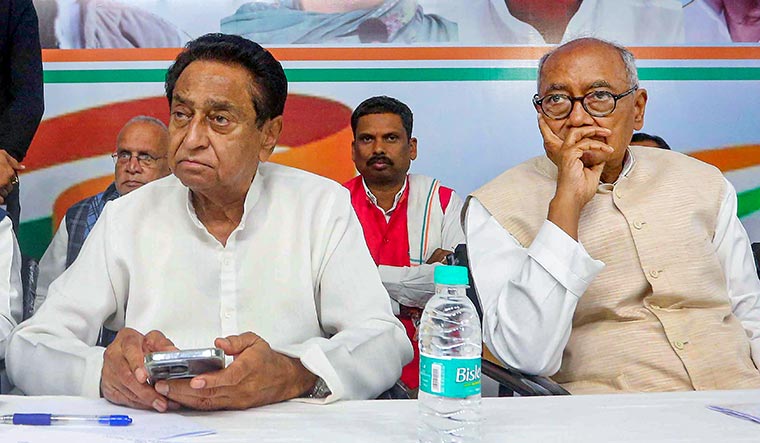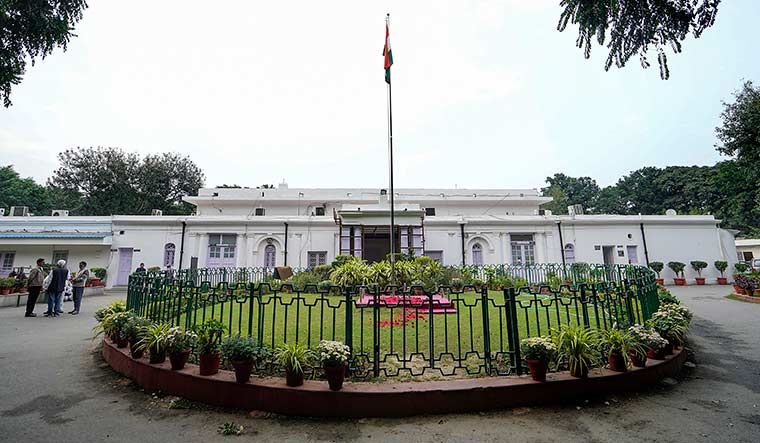In the past few months, especially after the Congress registered a victory in the assembly elections in Karnataka in May, there was a spring in the step of Congress leaders and workers. The party approached the assembly elections in November with confidence and what it felt was a winning formula it derived from Karnataka.
A win in Telangana, however, has been overshadowed by the party’s wipeout in the three Hindi heartland states―Madhya Pradesh, Rajasthan and Chhattisgarh. With just months to go for the Lok Sabha elections, the defeat in the three states comes as a huge dampener for the principal opposition party, raising serious questions about its electoral strategy to counter the BJP.
The Congress had hoped to win at least two of the heartland states. It was confident of holding on to Chhattisgarh, hopeful of wresting Madhya Pradesh and was trying to beat the revolving door politics of Rajasthan to stay in power. Having a foothold in the region would have provided the party with a much-needed morale booster in the Lok Sabha polls. However, the party finds its national footprint greatly diminished. In the Hindi belt, it is in power only in the hill state of Himachal Pradesh. Its other two states, Karnataka and Telangana, are down south. It is a junior ally in the ruling alliances in Tamil Nadu, Jharkhand and Bihar.
There was a sense of optimism after the victories in Himachal Pradesh in November last year and in Karnataka. And it was essential for the Congress to register victories in the Hindi heartland where it was locked in direct contests against the BJP, especially since its ability to defeat the BJP in one-to-one fights has increasingly come under question. Its populist guarantees, the mainstay of its campaign in Karnataka, figured in these polls, too, and the declaration of ‘Jitni Abadi, Utna Haq’ (proportionate reservation) by party leader Rahul Gandhi in the southern state took the form of a clear backing by the party of the demand for a caste census.
On the day the assembly elections were announced, Rahul had at a news conference in Delhi announced his party’s firm support for a caste census. The party included caste census in the poll manifestos. It was a bold move, marking a U-turn from its traditional stance on Mandal politics. Madhya Pradesh, Rajasthan and Chhattisgarh all have a substantial population of Other Backward Classes, the main beneficiaries of a caste census. And the Congress chief ministers in Rajasthan and Chhattisgarh―Ashok Gehlot and Bhupesh Baghel―belonged to the OBC category. However, the strategy appears to have failed. The trust of the OBCs in the BJP and in Modi, it appears, has not wavered.
There is a feeling in the Congress that its announcement on caste census was abrupt and that there was not enough time to put in place a clear messaging. Perhaps the announcement also consolidated the support of the upper castes further for the BJP.
The allegations made by the Congress about crony capitalism and about the rich-poor divide widening also failed to resonate with the people. These are among the issues that the Congress wanted to raise in the run-up to the Lok Sabha elections also.
With just six months to go for the Lok Sabha polls, the Congress will have to take a long, hard look at its poll narrative. The party finds itself in the unenviable situation of reworking its messaging. These assembly elections have been described as the semi-final before the big fight in 2024. Arguably, there is no direct correlation between assembly elections and Lok Sabha polls. As pointed out by some Congress leaders, the party lost Madhya Pradesh, Rajasthan and Chhattisgarh in 2003 and yet it came to power at the Centre in 2004. Also, in 2018, the Congress won all three states and yet the BJP swept the region in the Lok Sabha polls. “This is not a rejection of the Congress in the Hindi heartland. We have not been thrown out by the voters,” said Congress leader Manickam Tagore. “I will not describe the verdict as a rout. But we have to begin in earnest our efforts to make a comeback.”
 Searching for answers: Madhya Pradesh Congress leaders Kamal Nath (left) and Digvijaya Singh after the party’s loss in the assembly elections | PTI
Searching for answers: Madhya Pradesh Congress leaders Kamal Nath (left) and Digvijaya Singh after the party’s loss in the assembly elections | PTI
However, the Congress does realise that the BJP is differently placed now as compared with 2003 and is much better equipped to take advantage of the wins in the Hindi heartland. In fact, it is felt that the voters in these states, while willing to opt for a non-BJP alternative at the state level, are still more inclined towards the BJP at the Centre. Modi’s enduring popularity is the main reason for this.
The BJP campaign in the states was based on its core agenda of hindutva, nationalism, development and labharthi (beneficiary) politics. It had Modi as the mascot. The results suggest that Modi’s popularity, especially among the youth and women, continues to be high. It will be difficult for the Congress to prevent the BJP from benefiting from the wins and bring about any kind of turnaround. “Even winning the three states would not have guaranteed that we would have done well in the Lok Sabha polls. We cannot take even Himachal Pradesh, Karnataka or Telangana for granted,” said a senior Congress leader.
The poll results are already making an impact on the opposition INDIA grouping. It was important for the Congress to do well in these elections for it to claim pole position in the alliance and bargain for seats from a position of strength. The Congress had put the INDIA discussions on the back burner and refused to enter into seat sharing with alliance partners in the state elections. They are now letting the Congress know that they cannot be taken for granted. Shortly before the results came out, Congress president Mallikarjun Kharge dialled alliance partners to have an INDIA meeting on December 6. However, in the wake of the lukewarm response from many of them, the meeting has been postponed.
The Congress will have to deal with greater belligerence from its alliance partners post the election defeats. Also, since it has failed in the direct contests against the BJP, allies will question what the Congress and its leaders, especially Rahul, bring to the table. Rahul’s Bharat Jodo Yatra was given credit for the victory in Karnataka. Now, while the party maintains that it was a big factor in Telangana, critics will ask why the march did not have an impact in Rajasthan or Madhya Pradesh, two other states where it had passed through.
Regional parties are likely to argue that they have been more successful in curbing the growth of the BJP on their turf and question the Congress capabilities to defeat the saffron party in around 200 seats where they are locked in a direct contest. In 2019, the Congress and the BJP faced off in 186 seats. The Congress won only 15. The INDIA group partners would want the Congress to do well in at least around 140 seats, which now appears a tall ask. “We are saddened by the Congress defeat in these elections. Had the Congress won, the road to 2024 would have become smoother for us. The Congress did not abide by the commitment it had made about going it together with INDIA alliance partners,” said K.C. Tyagi of the Janata Dal (United). “They did not have any discussions with alliance partners or work out any seat sharing with the allies. The Congress leadership, especially Rahul Gandhi, worked hard in these elections. But all their efforts paled before the BJP’s face, which was Modi, its organisation and its resources.”
INDIA partners are already upset with the Congress over frittering away the momentum that had been built with regard to alliance discussions. Many of them had wanted seat sharing to be sealed by October 31, which did not happen. “The ball is now in the Congress court,” said Rashtriya Janata Dal’s Rajya Sabha member Manoj Jha. “We believe that the Congress continues to be the party with maximum national footprint. I am confident that the Congress realises that it is only by coming together that we can defeat Narendra Modi and the BJP in the Lok Sabha elections. The collective nature of the alliance is the only alternative to the self-centred politics of Modi.”
Also Read
- How BJP's planning made the difference in MP, Rajasthan and Chhattisgarh
- BJP next target in MP? 51 per cent vote share in 2024 LS polls
- 'Want to serve people till my last breath': Shivraj Singh Chouhan
- BJP might introduce aggressive governance in Rajasthan. Here's why
- How Revanth Reddy won a battle of personalities against KCR
- Ten reasons the BRS could not score a hat-trick in Telangana
The Congress is expected to find the bargaining to be tough. In Uttar Pradesh, the Congress is learnt to have demanded 20 to 30 seats in an alliance with the Samajwadi Party. But the Samajwadi Party is upset with the manner in which it was snubbed by Congress leader Kamal Nath in Madhya Pradesh, and would be unwilling to give the Congress more than five seats. The allies in Tamil Nadu, Bihar and Maharashtra, too, are expected to drive a hard bargain.
The Aam Aadmi Party has already rubbed it in by reminding the Congress that it is now the biggest opposition party in north India, with governments in Delhi and Punjab. The AAP is expected to insist on its proposal to contest five out of the seven seats in Delhi, and also seek a seat-sharing arrangement in Punjab, where the Congress state unit is staunchly against any alliance with Arvind Kejriwal’s party, and even in Haryana.
In West Bengal, where the Congress has been in an alliance with the left, the party is expected to be challenged by the Trinamool Congress over the division of opposition votes. The Trinamool is said to have offered the Congress two seats. The Congress and the left are bitter foes in Kerala, and the complicated nature of their association became clear after left leaders asked Rahul not to contest from the state in the Lok Sabha polls.
The assembly poll setback has made the Congress’s Lok Sabha campaign, which was already an uphill task, much more difficult.


